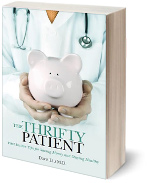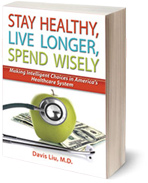Recasting the Patient as Consumer – Good Idea? Consumer Driven Health Care?
Are patients now consumers? I recently jumped at the opportunity to attend the 2013 Healthcare Innovation Summit at Stanford Graduate School of Business. Subtitled IT-Enabled Disruption, it featured opening keynote speaker Aetna CEO Mark Bertolini, Stanford psychologist and lecturer Dr. Kelly McGonigal, and many other interesting people asking – how do we change health care?
Recasting the Patient as Consumer
As a practicing primary care doctor, the most intriguing session was labeled – “Recasting the Patient as Consumer”. I have major reservations that this is what patients really want. I have some skepticism on whether consumer driven health care can truly make care more affordable (here, here, here, and here). Was the current fad of pushing the onus of health squarely on the individual may be too simplistic?
Panel members included:
- Ron Gutman, founder and CEO of HealthTap
- Bassam Kadry, Anesthesiologist and Participatory Medicine Advocate
- Ann Lamont, Managing Partner of Oak Investment Partners
- Kelly McGonigal, Health Psychologist and Lecturer at Stanford
- Moderated by Constantia Petrou (MBA 2002), founder of Konnectology
Ms. Petrou started the session by citing November 2011, NY Times columnist Paul Krugman’s piece – Patients are Not Consumers and Frank Moss’ piece – Our High-Tech Health-Care Future. Two very different points of view.
Patients are Not Consumers – Paul Krugman – NY Times
How did it become normal, or for that matter even acceptable, to refer to medical patients as “consumers”? The relationship between patient and doctor used to be considered something special, almost sacred… “Consumer-based” medicine has been a bust everywhere it has been tried….Medical care, after all, is an area in which crucial decisions — life and death decisions — must be made. Yet making such decisions intelligently requires a vast amount of specialized knowledge. Furthermore, those decisions often must be made under conditions in which the patient is incapacitated, under severe stress, or needs action immediately, with no time for discussion, let alone comparison shopping.
Our High-Tech Health-Care Future — Frank Moss
We are in the early phases of the next big technology-driven revolution, which I call “consumer health.” When fully unleashed, it could radically cut health care costs and become a huge global growth market….I acknowledge that this goal is very optimistic, given the paternalism of the medical profession, the poor health habits of most Americans and the perverse incentives of our health care system…Recent history has shown that when the right cultural, technical and economic forces converge, people can transform fundamental aspects of society from the bottom up in a way that seemed impossible just a short time before. I believe that such a time is coming for health care.
With that background, my question to the group:
My question to the panelists
“I’m a practicing primary care doctor. I wanted your thoughts. I agree that consumer engagement is important in health care, but I wanted to use a different analogy.
Let’s go back 40 years and talk about consumer engagement when it comes to retirement planning. It was defined benefit and now defined contribution with the thinking being if people had “more skin in the game” that we would also choose wisely since all of us will need to retire at some point. Yet a recent Employee Benefits Research Institute survey found that over half had less than $25,000 in their bank account.
As a doctor, I find this particularly worrisome and déjà vu all over again except instead of the stakes being how much in money you have it is about your health,
Unlike retirement where you can work longer to put more away, that isn’t always true in health care.
What level of consumerism do we need, in terms of learning from the past and not repeating the same mistakes?
What level is that responsibility at the individual level, employer level (business to business) in designing systems and benefits in nudging the right behavior, and at the societal level (what do communities want) and what do cities want to nudge the right behavior?
Not talking about health care per se, but more about human behavior? Do people really want this responsibility? Is this what patients really want to do?”
From Ron Gutman, founder and CEO of HealthTap.
He noted that “it is critical to create an infrastructure to facilitate trust and information and make it easy to access and personalized for individuals. Allow people to engage and meet people where they are in change. Not push people to change. Health care is very broad and people are in different points in life and need for change.”
From Dr. Bassam Kadry, anesthesiologist
He observed that “many of the challenges we are facing is cultural. A lifetime of savings can be wiped out with an extended ICU hospitalization even despite great preventive care. There really isn’t much choice. Forget the clinic choices you have. Doctors don’t know the costs of the intervention. The bottom line is that culturally we are not willing to say enough is enough. Clinically, there is a point that doing more causes more harm. Having these discussions is very important. Over 60 percent of bankruptcies are due to medical related costs. Seventy-five percent of those had health insurance. Both preventive care and end of life care are very important. There is no transparency of costs for patients or doctors. Until that problem is solved, there will be no progress. Unless you can measure it, you can’t manage it.”
The moderator asked, “When people are invited to choose insurance when healthy, has there been a change in behavior? Will this trend last?” and posed the question to Lamont.
From Ann Lamont, Managing Partner of Oak Investment Partners
“People are choosing the least expensive option in the private or public insurance exchanges. It will be interesting experience over the next couple of years. Are people paying for the coverage that they really need? Those with pre-existing conditions may be able to move up their coverage with little penalty and it will be this issue that may cause the system to break down.
It is incredibly important to engage the consumer. Unless the incentive changes from fee for service to value based system the wrong incentives will remain in the place. A value-based system will change behavior. For example, a group of oncologists reviewed chemotherapy treatments in the 6 months of life.
Thirty percent of people should not have been given the treatments; these were known by the oncologists. By implementing protocols over the past 2 years, they have managed to decrease hospitalized days by 51 percent.
Though there was less cost and less hospitalization, from the patient perspective it would be beneficial. Less time in the hospital for treatment, which was of no benefit to the individual patient.”
From Kelly McGonigal, Stanford Health Psychologist, Lecturer
She reflected, “Can people be trusted to make right decisions for their future self? Based on the science, influencing individual behavior requires structural and social changes. Politically and culturally we are not ready for that, specifically to make the structural and social changes needed to do things in your own best interest. She has been very interested in interventions which create “microclimates” where individuals are setting up for themselves different norms, creating structures of accountability, and technology that allows individuals to do that as well. An app for example that sends a special message a person setup herself when near the gym or Dunkin Donuts.
To do this, whether at a societal level, microclimate level (hospital support group), or individual level, this requires an endorsement of certain values. It is this aspect, however, which is often left out.”
My thoughts?
Done correctly, patient engagement will make care more personalized and caring. Implemented or designed poorly, the trend of recasting the patient as consumer could wind up making more problems with many of us driven to less than desirable behaviors of obesity, debt, and inactivity simply because that is “what we and the consumer market wants”.
What do you think?
Here’s the entire session. My question is at 28:43.

 Get important exclusive advice and tips on how to save money while staying healthy.
Get important exclusive advice and tips on how to save money while staying healthy. Learn how to make intelligent choices in America's Healthcare System.
Learn how to make intelligent choices in America's Healthcare System.